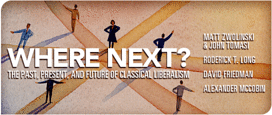My first questions are for Zwolinski and Tomasi and have to do with their view of social justice:
1. You refer to Rawls’ position as one of the “philosophically most sophisticated” formulations of the ideal of social or distributive justice. Do you find his derivation convincing? If so, and if you believe that a libertarian society best satisfies its requirements, would you be in favor of basing your defense of libertarianism on that claim rather than on utilitarian or natural rights arguments?
2. Why do you find the claims of the “laboring poor” more morally compelling than those of anyone else—including those who are unable to work due to physical handicaps, lack of employment opportunities in their particular environment, or the like? What about the claims of someone who has a large income but even larger medical costs, due to factors not his own fault? What is special about the laboring poor that distinguishes them from other people who are badly off for reasons not their own fault?
3. There are a large number of laboring poor outside the United States who are a great deal poorer than the laboring poor in the United States. Does it not follow that the effect of policies on the latter group is irrelevant by any non-nationalist version of a “welfare of the worst off” criterion, and that the defense of libertarianism, or any alternative, ought to be based on its effects on people in China and India and Africa, not Watts and Harlem?
And one small question for Alexander McCobin. You write:
While libertarians agree on things like the need for minimal government
Did you really intend, while rejecting any libertarian purity test, to read me, Rothbard, Spooner, and all other libertarian anarchists out of the libertarian movement?
Alexander McCobin responds:
I did not mean to exclude anarchists from libertarianism. Note that I said “the need for minimal government” rather than “a minimal government,” as in it is a libertarian value in general to have less government than more government. The purpose was to encompass both minarchism and anarchism.

